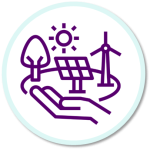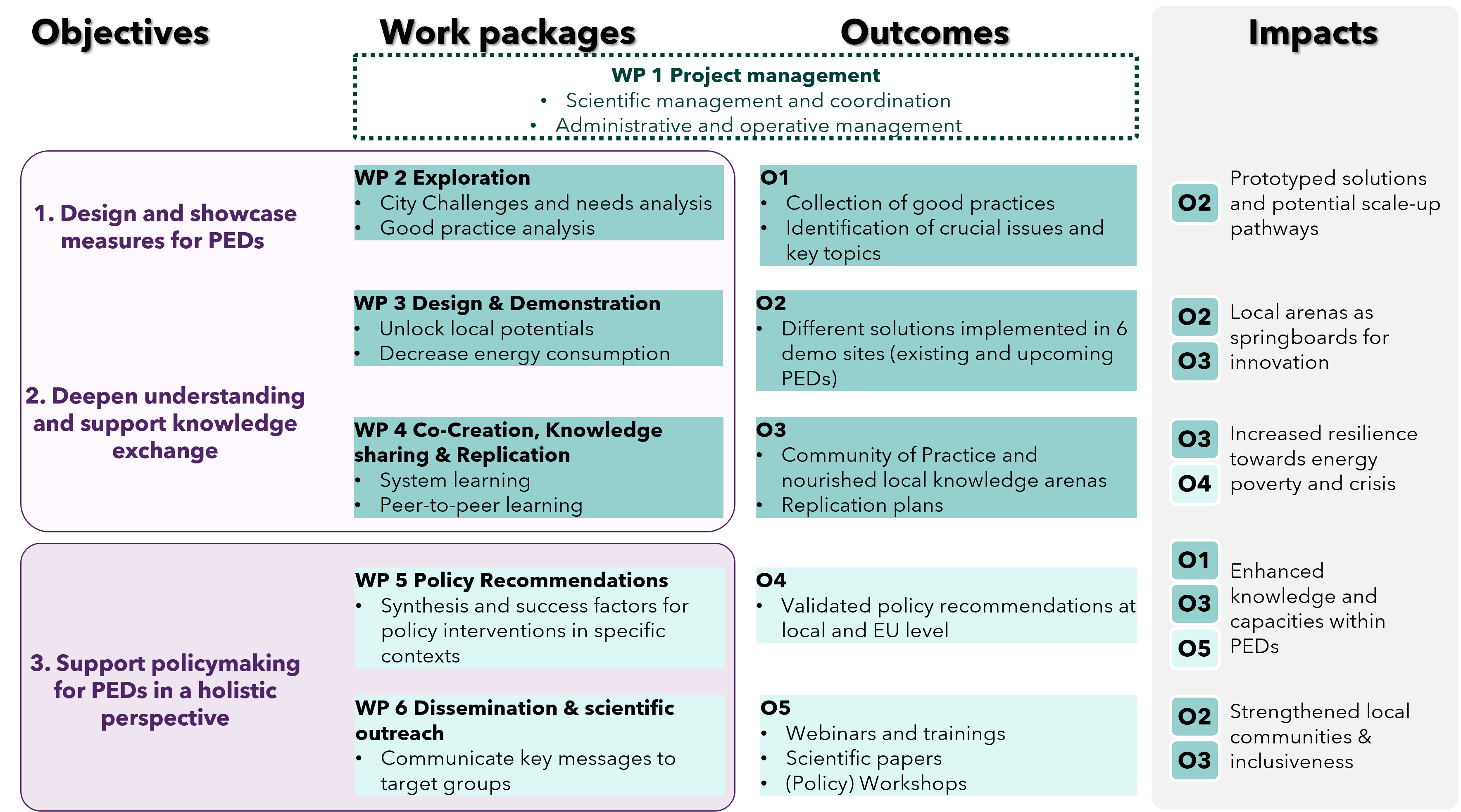Navigating turbulent waters:
RePowering cities in times of crisis
Interlinking local sites across Europe to make PEDs more resilient under current energy challenges.
NEEDS Repowered is addressing current pressing challenges on six Repowered Sites, researching how policy design and targeted PED development can tackle energy poverty. The project integrates social innovation, citizen engagement, and technological solutions to enhance energy resilience in PEDs. By fostering co-creation among stakeholders, it aim to support policy alignment, and promote behavioural change, prioritizing energy citizenship, and empowering communities to actively participate in energy transitions.
Addressed Challenges across Sites
Urban sustainability challenges, including high shares of unrenovated apartment blocks, deteriorating air quality from traffic emissions, and grid capacity shortages.
Fragmented service systems, legal barriers, and lack of regulatory frameworks for shared energy solutions. Lack of incentives for refurbishment and scalable models for energy communities.
Key barriers to energy efficiency and resilience, including the lack of integrated retrofitting solutions, missing incentives for behavioral change, and energy poverty.
Our Objectives

Design and showcase measures for PEDs enhancement
through retrofitting solutions and co-created sustainable business and financing models to support deep renovation, integrated energy systems, and grid stability

Deepen understanding & support knowledge exchange
by collecting success factors, barriers, and ownership structures around PEDs. The project’s Community of Practice (CoP) will contribute to improving the knowledge base and sharing lessons learnt

Support policymaking for PEDs holistically
by identifying gaps, integrating energy transition into urban planning, and developing validated policy recommendations towards the replication and scaling of solutions across diverse contexts
Our holistic and inclusive approach
NEEDS Repowered implements a holistic approach to tackling energy vulnerability, enhancing the resilience of Positive Energy Districts through innovative retrofitting solutions and behavioural incentives. Each Repowered Site explores unique strategies to help cities withstand energy crises by unlocking local potential, improving efficiency, and reducing overall consumption.
Repowered Sites are focusing on different challenges, supported by experts from various fields who bring best practices and innovative solutions from past projects. Together, they develop a joint methodology for engaging communities, co-creating solutions, and monitoring progress. Through collaboration, knowledge-sharing, and smart strategies, NEEDS Repowered will pave the way for sustainable, efficient, and people-centered urban energy systems.

NEEDS Repowered approach aims at building resilient and inclusive Energy Communities
How we work…
NEEDS Repowered is funded under the Driving Urban Transitions Partnership, co-funded by the European Commission. Beyond its Administrative (WP 1) and Communication (WP 6) efforts, the project is structured into key
Work Packages, each driving innovation and collaboration to advance urban energy transitions.

WP 2
Exploration & Stocktaking
Identifying needs, pre-conditions, and good practices to inform the design of behavioural change interventions. Gathering relevant information and insights on PEDs to inform the stakeholder analysis, with a focus on community-based transformation and inclusion of vulnerable groups.
WP3
Design & Demonstration
Design and implementation of demonstrations across the Repowered Sites. The main objective is to plan, implement and showcase the NEEDS Repowered activities as well as to enable upscaled deployment and roll-out of successful solutions.
WP4 Co-creation, Knowledge sharing & Replication
Focusing on inter- and transdisciplinary system learning, the project will set up a Community of Practice (CoP) to feed back into local knowledge arenas and thereby implement the critical learning processes of civil servants and stakeholders involved at the local level.
WP5
Policy Recommndations & Knowledge Hub
In order to ensure policy relevance this working step will focus on the translation of scientific results into policy recommendations. By contributing to DUT’s Knowledge Hubs, the project will share experiences and results with international actors
Project Duration: 02.2025 – 01.2028
Our Community of Practice
In NEEDS Repowered, the set up of a Communities of Practice aims at facilitating knowledge sharing and improvement across organisational boundaries by establishing co-learning systems. These systems host members from other cooperative
systems that help enhance knowledge production and sharing. Such cooperative systems serve as powerful tools to leverage accumulated knowledge.
In NEEDS Repowered, cooperative systems are organised “knowledge arenas” that manage, exchange, and retain collective knowledge in specific areas.
The project will establish different knowledge arenas delaing with crucial topics for PEDs such as regulatory frameworks, strategic cooperation and stakeholder engagement as well as effective deployment of innovative business
models for integration of renewables and deep refurbishment.
Nurturing of local knowledge arenas
Our CoP host core members, who actively manage knowledge, and peripherial members, who primarly access and re-use knowledge. Within the CoP, knowledge arenas ensure continuous update of knowledge, sharing lessons learned, ensuring its relevance and applicability in diverse contexts. Their key fuctions are:
- Facilitating Knowledge Sharing: bridging the divide between theoretical research and practical application.
- Transferring Practical Knowledge: Enabling the transfer of practical knowledge to researchers.
- Disseminating Knowledge: spreading acquired knowledge to other projects and future endeavours.
Our Pilot Sites
NEEDS Repowered brings together six European cities—Innsbruck, Karlsruhe, Kraków, Iași, Budaörs, and Helsingborg—each tackling unique energy challenges while working towards more resilient and sustainable PEDS.
Innsbruck, Austria
Developing efficient, decarbonized heating solutions , exploring photovoltaic integration, and fostering collaboration between landlords, tenants, and energy providers.
Karlsruhe, Germany
Fostering knowledge transfer and lowering participation barriers for supporting solar energy initiatives, and promoting balcony PV projects.
Kraków, Poland
Designing and setting up an e-community platform , linking solar energy prosumers with electric vehicle users towards creating a decentralized charging network.
Iași, Romania
Leveraging smart grids, behavioral change incentives, and recyclable materials to enhance energy performance.
Helsingborg, Sweden
Focus on shared energy solutions , balancing business models, policy planning, and community needs.
Budaörs, Hungary
Supporting the creation of a transparent energy-sharing system , mobilizing energy communities and developing scalable business models for PEDs.


